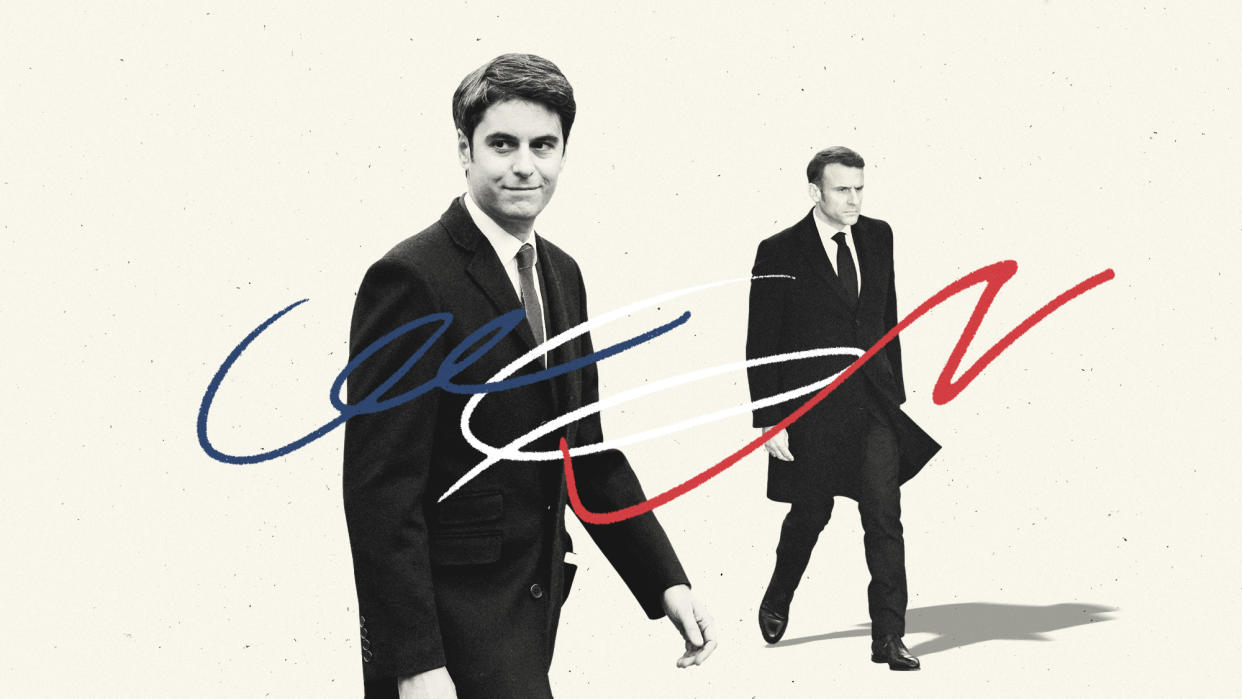Protégé in Paris: will Macron's new PM rejuvenate flagging presidency?

- Oops!Something went wrong.Please try again later.
Emmanuel Macron hopes to re-set his flagging presidency by appointing the youngest-ever and first openly gay prime minister in French history.
The French president is seeking to "rejuvenate his troubled second term after facing mass protests against a pensions reform last year and bitter dissensions within his own camp over an immigration bill which left his governing coalition badly bruised", Politico reported.
The 34-year-old Gabriel Attal will be charged, first and foremost, with ensuring that centrist forces overcome the far-right, in European elections in June and then in presidential polls in 2027.
What the papers said
"A child of Paris's elite circles", Attal "arrives with significant political experience despite his youth," said Victor Goury-Laffont on Politico.
A consultant by profession, the new prime minister comes from a wealthy family in the capital's south and was educated at the exclusive schools and universities that groom the French governing class. He was an early defector to Macron's En Marche! party in 2017 and rose quickly from government spokesperson and junior minister, then "broke through to stardom" when he took over the Education Ministry five months ago, said The Times.
"Gabriel saw straight away the modernity that Macron's election could bring," Hervé Marseille, a French senator, told the Financial Times. "Attal is an extension of that movement – a baby Macron."
Unlike his predecessor, the "bloodless" Elisabeth Borne, said The Spectator, Attal is "comfortable in front of a camera and is a polished communicator". His is a more "combative style", agreed France 24, and "despite his relative inexperience, he has earned a reputation as a firm and decisive figure".
Policies pushed by Attal during his relatively short tenure at the Education Ministry included a ban on abayas, the long robes worn by some Muslim women, in schools; bypassing parental approval to hold students back a year; measures to increase the difficulty level of standardised tests; a new civic service for teenagers; and trials for compulsory uniforms in schools.
These have won him the admiration of conservatives, whose support Macron needs to push through legislation, and – along with his openness about the homophobic and antisemitic bullying he suffered in his youth – made him the most popular politician in France, according to an Ipsos poll released in December.
What next?
The move "was a risky and surprising choice by Macron", said the FT, and one that he may come to regret if Attal "overshadows him in the waning years of the president's second term".
But "an appeal to the right is vital for Macron", said The Times, especially given the rising tide of support for Marine Le Pen and her party with the European elections and then the presidential election on the horizon for 2027.
Macron currently holds a lowly 30% approval rating according to aggregated polls, reported Politico, and his coalition trails Le Pen's National Rally by about 10 points in European election polling.
With Islamic extremism, the economy, immigration, insecurity and violent crime top of the agenda, Macron "wants Attal to rein in the right, but there is a growing feeling in France that Le Pen's party are unstoppable", said The Spectator, which added that Attal "has youth on his side, but he hasn't got time".
The conservative Le Figaro thinks Attal's appointment will do little to arrest the drift of the Macron administration. "Changing one face at the top does nothing to change the overall picture," the paper remarked.
"This scepticism is shared by many on the left," said The Spectator.
As the president's nominee, "he is the wunderkind's wunderkind", said the BBC's correspondent in Paris, Hugh Schofield. "But if he is only Macron's mini-me, the marvel could prove a mirage."
In an interview on Monday night, before Attal was named as PM, the MEP Raphaël Glucksmann joked that he already knew who the holder of the title would be. "It's Emmanuel Macron!" said Glucksmann. "And the foreign minister will also be Emmanuel Macron, as will the defence minister and the culture minister."
Therein lies the problem for Macron. He has so dominated French politics since he emerged out of nowhere to win the presidency in 2017 – in the process completely re-shaping the political map – that the traditional function of prime ministers "to shield the president by taking the political heat while executing his orders", according to The Times, has been weakened.
Ultimately, the fortunes of Macron's presidency – and the centre in France – will be tied to him, not his prime minister.

